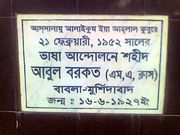
Abul Barkat
Encyclopedia

East Pakistan
East Pakistan was a provincial state of Pakistan established in 14 August 1947. The provincial state existed until its declaration of independence on 26 March 1971 as the independent nation of Bangladesh. Pakistan recognized the new nation on 16 December 1971. East Pakistan was created from Bengal...
(currently Bangladesh
Bangladesh
Bangladesh , officially the People's Republic of Bangladesh is a sovereign state located in South Asia. It is bordered by India on all sides except for a small border with Burma to the far southeast and by the Bay of Bengal to the south...
), in 1952.
Abul Barkat was born at village Babla in Bharatpur Thana of Murshidabad
Murshidabad
Murshidabad is a city in Murshidabad district of West Bengal state in India. The city of Murshidabad is located on the southern bank of the Bhagirathi, a distributary of the Ganges River. It was the capital of undivided Bengal during the Mughal rule. Nawabs of Bengal used to rule Bengal from this...
, Bengal
Bengal
Bengal is a historical and geographical region in the northeast region of the Indian Subcontinent at the apex of the Bay of Bengal. Today, it is mainly divided between the sovereign land of People's Republic of Bangladesh and the Indian state of West Bengal, although some regions of the previous...
(now in India
India
India , officially the Republic of India , is a country in South Asia. It is the seventh-largest country by geographical area, the second-most populous country with over 1.2 billion people, and the most populous democracy in the world...
) and migrated to Bangladesh (the then East Pakistan) in 1948. Barkat was the son of Shamsuddin. He passed his matriculation from Talibpur High School in 1945 and passed the intermediate from the Berhampore Krishnath College
Krishnath College
Krishnath College its a liberal arts and sciences college in Berhampore, Murshidabad, in the state of West Bengal in India. Initially this college was affiliated with...
in 1947, as a student of the University of Calcutta
University of Calcutta
The University of Calcutta is a public university located in the city of Kolkata , India, founded on 24 January 1857...
. He came to East Bengal after the partition of India in 1948, and resided at his uncle's house named “Bishnupria Bhaban”. In the same year he got admitted to Dhaka University to study political science. He received his honors in 1951 where he stood fourth in the second class. He was a Masters student of the University of Dhaka.
Abul Barkat was not an active politician but a politically conscious one. On February 21, 1952 he went to Amtala to join the meeting. When police opened fire Barkat was seriously injured and later died at the Dhaka Medical College at about 8 p.m. that day. Later he was buried in the Azimpur Graveyard. Abul Barkat was awarded Ekushey Padak
Ekushey Padak
Ekushey Padak is one of the highest civilian awards in Bangladesh, introduced in memory of the martyrs of the Language Movement of 1952 that took place on February 21, 1952.-2001:*Shah Abdul Karim...
in 2000.
External links
- Short biography in Prime Minister's official web site, Govt of Bangladesh

